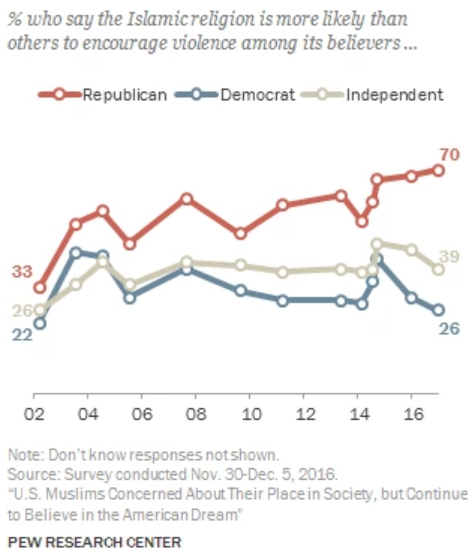LETTER TO THE EDITOR: Who are the refugees?
Editor’s Note: To submit a response to this column, or submit a letter to the editor on a new topic, email your submission to opinion@usustatesman.com
Who are the refugees?
A study by Jack Harris, Sierra Benson, and Kevin Brown
refugee (re-fyu̇-ˈjē) noun: one that flees (Merriam-Webster)
In September 2018, Secretary of State Mike Pompeo announced the United States’ intention to lower its refugee admissions cap to 30,000 people per year, the lowest it’s been since the passage of the 1980 Refugee Act (Davis). Given the current world refugee count of over 25 million, a decision like this requires significant justification (UNHCR). The admissions cap was lowered upon the assumption that by allowing middle-eastern people into the country, we risk opening our doors to ISIS and other terrorist groups. Through our research, we have discovered very little evidence that terrorism is entering America through our refugee program. However, we have learned a great deal about the various ways Americans have been led to believe that it is.
One of those ways is through the political rhetoric of our day. People of the Middle East and members of the Islamic religion have long been associated with terrorism in the US. As a result, refugees have been slandered regularly by our nation’s president Donald Trump. Trump’s anti-immigration goals were made clear early on in the presidential race beginning in 2015. His efforts in advancing this goal were largely comprised of attacks on the character of refugees in general, stating that he believed many of them were “ISIS aligned” and that this was “going to be the great Trojan Horse” (CNBC).
This technique was apparently effective. According to a recent PEW research study, among the members of Trump’s party suspicion of the Islamic religion as violent has risen gradually since the start of the presidential race in 2015 to reach an all-time high of 70% at the end of 2016. The data in this study represent a general mistrust of refugees held by many Americans. The political rhetoric of recent years has been a factor in maintaining that suspicion, but it has not been the initial cause of it.
Terrorism and Muslim extremists have given media and news organizations some of their biggest stories in recent history, and the effects among Americans have been considerable. In 2014 terrorist attacks increased by nearly 35% worldwide (BBC News Report), the resulting spike in negative perceptions of Muslims was extreme among Americans surveyed by PEW Research Center’s Religion and Public Life Project.
As terrorism has occurred, America has always taken steps to prevent its continuing occurrence. However, in the face of the greatest humanitarian crisis since World War II, a closed door policy may turn out to be an unnecessary precaution. Every refugee entering the US legally must pass through an intensive vetting process that will generally take over three years, and Alex Nowrasteh of the Cato Institute argues that there won’t be many ISIS soldiers willing to spend three years in a refugee camp with a less than 1% chance of ever entering the US when “almost any other option to do so is easier, cheaper, and quicker.” The statistics prove him right. In fact, of the 859,629 refugees who have legally entered the US since September 11th 2001, only 3 have been arrested for terrorist acts and none were successfully carried out (Nowrasteh). The arguments for lowering the refugee admissions cap based on security fall apart upon that concept.
In conclusion, by preventing refugees from entering the country, we have not prevented terrorists from entering the country. We have only turned our back on 25 million desperate people who we could easily have helped (UNHCR). With the opportunity to support these people in need through carefully considered votes, Americans have the capacity to make a powerful impact on refugees’ lives by helping them enter the gates of safety.
Works Cited
“Refugee.” Merriam-Webster, Merriam-Webster, www.merriam-webster.com/dictionary/refugee.
United Nations. “Figures at a Glance.” UNHCR, www.unhcr.org/en-us/figures-at-a-glance.html.
Davis, Julie Hirschfeld. “Trump to Cap Refugees Allowed Into U.S. at 30,000, a Record Low.” The New York Times, The New York Times, 17 Sept. 2018, www.nytimes.com/2018/09/17/us/politics/trump-refugees-historic-cuts.html.
“Donald Trump: Syrian Refugees Will be the Great Trojan Horse” Youtube, uploaded by CNBC, 19 October 2016, www.youtube.com/watch?v=hB4U4Oe-Dfk&t=8s
Mitchell, Travis. “How the U.S. General Public Views Muslims and Islam.” Pew Research Center’s Religion & Public Life Project, 26 July 2017, www.pewforum.org/2017/07/26/how-the-u-s-general-public-views-muslims-and-islam/pf_2017-06-26_muslimamericans-07-06/.
“Terror Attacks Increased by a Third in 2014, US Says.” BBC News, BBC, 19 June 2015, www.bbc.com/news/world-us-canada-33206784.
Nowrasteh, Alex. “Syrian Refugees Don’t Pose a Serious Security Threat.” Cato Institute, 18 Nov. 2015, www.cato.org/blog/syrian-refugees-dont-pose-serious-security-threat.


